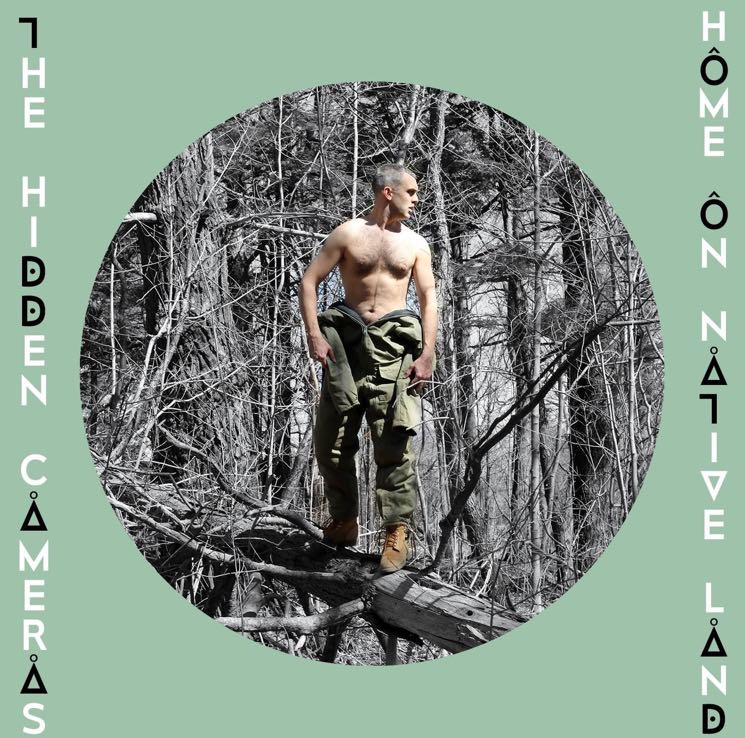The Hidden Cameras' seventh album, Home on Native Land, is about returning; literally leaving Canada for Berlin and then returning, but also returning in a musical tradition sense. The album is the home singer/songwriter Joel Gibb has had earmarked for his more country and Canadiana songs for about a decade, but in the meantime, he was working on other albums (Awoo, 2006; Origin:Orphan, 2009; and Age, 2014). So it's been a long time coming, this gloriously subversive, playful, occasionally morbid "gay church folk" indie pop country harvest.
But is it really country? Like, really? Well, in a lot of ways, sure, yes. Lead single "The Day I Left Home" manages to prance along over a familiar-to-Cameras-fans beat (for the uninitiated, basically all Hidden Cameras songs are hymns set to a marching indie pop rhythm, originally provided by drum machine), but drummer and recording engineer Don Kerr (Rheostatics) has imbued it with a shuffling rootsy feel, and there are beautiful Americana textures throughout (banjo, double bass, pedal steel and joyfully bright piano care of Brian LeBarton).
The album offers so many delights, not least of which is hearing "He Is the Boss of Me" (a love song recorded on a four-track for 2001's Ecce Homo) finally see the light again, only fully realized this time, with strings and a full band. Carrying on that joy is the two-minute-long, lyricless chant "Ode to an Ah," featuring backup vocals by Neil Tennant of the Pet Shop Boys.
If musical guests are a tradition in roots music, so is a well-chosen cover. Gibb has a few of these on Home on Native Land, and they're all fabulous: Dan Penn and Chips Moman's 1967 soul song "The Dark End of the Street" takes on a country-soul flavour and another dimension of meaning — it no longer sounds just like a song about cheating; "Log Driver's Waltz" is the slice of romp-ish Canadiana you didn't know you were unfortunate to be living without (Feist, Mary Margaret O'Hara and Rufus Wainwright on backup vocals is basically camp sublime); and it's worth thanking Gibb for reminding us about Tim Hardin with "Don't Make Promises."
Not all of Home on Native Land's 14 songs are such memorable and successful country rock experimentations. The album's highlights seem to be mainly stacked on either side like bookends, with a few tunes in the middle kind of dragging things down, so that even with vocal support from Jessica Joi, Courtney Harrell, Daniella Gesundheit, Sandy Mack and Faye Allen, "Counting Stars" — a gospel song about not ascending to heaven — can feel wearying.
Maybe that comes with the territory of making a relaxed and generous (read: long) album. For the most part, Home on Native Land is filled with Gibb's signature breaths of melodic fresh air, healthy for a Canadian folk scene that could use some idiosyncrasy and a dark sense of humour, even if Gibb is only a passing visitor. Besides, the country blues coda "Twilight of the Season," with Ron Sexsmith and Tim Bovaconti sitting in and a refrain of "Goodbye," gets better every time.
(Outside)But is it really country? Like, really? Well, in a lot of ways, sure, yes. Lead single "The Day I Left Home" manages to prance along over a familiar-to-Cameras-fans beat (for the uninitiated, basically all Hidden Cameras songs are hymns set to a marching indie pop rhythm, originally provided by drum machine), but drummer and recording engineer Don Kerr (Rheostatics) has imbued it with a shuffling rootsy feel, and there are beautiful Americana textures throughout (banjo, double bass, pedal steel and joyfully bright piano care of Brian LeBarton).
The album offers so many delights, not least of which is hearing "He Is the Boss of Me" (a love song recorded on a four-track for 2001's Ecce Homo) finally see the light again, only fully realized this time, with strings and a full band. Carrying on that joy is the two-minute-long, lyricless chant "Ode to an Ah," featuring backup vocals by Neil Tennant of the Pet Shop Boys.
If musical guests are a tradition in roots music, so is a well-chosen cover. Gibb has a few of these on Home on Native Land, and they're all fabulous: Dan Penn and Chips Moman's 1967 soul song "The Dark End of the Street" takes on a country-soul flavour and another dimension of meaning — it no longer sounds just like a song about cheating; "Log Driver's Waltz" is the slice of romp-ish Canadiana you didn't know you were unfortunate to be living without (Feist, Mary Margaret O'Hara and Rufus Wainwright on backup vocals is basically camp sublime); and it's worth thanking Gibb for reminding us about Tim Hardin with "Don't Make Promises."
Not all of Home on Native Land's 14 songs are such memorable and successful country rock experimentations. The album's highlights seem to be mainly stacked on either side like bookends, with a few tunes in the middle kind of dragging things down, so that even with vocal support from Jessica Joi, Courtney Harrell, Daniella Gesundheit, Sandy Mack and Faye Allen, "Counting Stars" — a gospel song about not ascending to heaven — can feel wearying.
Maybe that comes with the territory of making a relaxed and generous (read: long) album. For the most part, Home on Native Land is filled with Gibb's signature breaths of melodic fresh air, healthy for a Canadian folk scene that could use some idiosyncrasy and a dark sense of humour, even if Gibb is only a passing visitor. Besides, the country blues coda "Twilight of the Season," with Ron Sexsmith and Tim Bovaconti sitting in and a refrain of "Goodbye," gets better every time.
